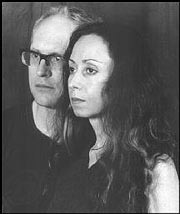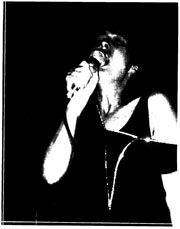MECCA NORMAL
BOBBY KARATE, GARDY LOO
CoCA, 1420 11th, 728-1980, $5
9 p.m. Fri., Sept. 20
It wasn’t exactly “Two Thumbs Up,” but it was still great feedback.
Vancouver, B.C., rock duo Mecca Normal were playing a show in L.A. last year, trying out new songs from their The Family Swan album. It wasn’t easy material, for the band or the audience. In the title track, for instance, singer Jean Smith recalls finding out about her mother’s breast cancer and then feeling responsible—for being born to an older mom and being too difficult to breast feed.
After the show, a man from the crowd approached Smith and told her how he, too, had similarly felt to blame for his mom’s disease and that he’d found solace in the song.
“And another person at that same show came up and said, ‘Man, that song was like twisting the knife.’ And I was nodding and waiting for her to say something like, ‘It made me feel . . . ,’ or, ‘It really made me think.’ But no, it was just a list of negative things that it had done to her,” recalls Smith. “Then she walked away.”
OK, Smith thought—at least I know I’m affecting people.
Which is a great comfort when you’re road testing an album. But the songs on The Family Swan—a disc in which melancholy is tempered only by a determination to massage the knots of the past out of the present—are more than just songs. They’re distillations of passages from Smith’s upcoming third novel, Living on Egg Shells. Feedback from the music will in turn inform her editing and rewriting when she returns to complete her written work in the winter.
When Mecca Normal—Smith and guitarist David Lester, musical partners of 18 years—appear at the Center on Contemporary Art this week, they’ll be bringing more than just a new album and a novel in progress. Their show will also include an exhibition of Lester’s posters on political agitators and of Smith’s 30-year series of self-portraits. (Their work is available for online viewing at mecca_normal. tripod.com.)
“It’s part of our vision for this tour and beyond that we don’t just come to town and do the shows from the stage and get off the stage and get away,” says Smith, who also creates the band’s album art and helps runs Smarten Up! & Get to the Point Publishing, Mecca Normal’s joint book house and record label.
“We want to interact. We want to create a realm of potential around the artwork and the songs, just to talk about why we’re doing this. Why we did it to begin with, how things have changed, and why we consider it important to deviate from rock show venues into places with the capacity to show art, to keep doing it into our 40s.”
Smith began painting self-portraits in 1973 at age 13. “Intense” and “unhappy” is how she describes her earliest renderings, a reaction to her father’s work for a stylish advertising agency. These days, she works without a mirror, painting from a vantage looking down at her breasts and legs. It’s an odd perspective—a woman’s view of herself, rather than a woman as seen by others—and one Smith says people rarely see replicated in public.
Mecca Normal have long challenged traditional notions of what we should see, particularly in a rock act. The band’s early tracks, like “Walk Alone” from The First LP (1986), were key influences in shaping the Riot Grrrl scene of the early ’90s. So, too, were the sparseness of their setup and Smith’s confidence in her unconventional voice—which veers from inviting warmth to acidic croaks.
Much of the just-released The Family Swan revolves around relationships with aging parents. Smith, 42, says she’s experienced profound sadness with her parents in recent years. “My mom is open about saying she regrets almost everything,” including having kids, Smith says. “I can barely even think about that. It’s like trying to understand how far the universe goes. What must that be like? That’s terrible. And it’s terrible to say to people that are in your life.”
The Family Swan takes those kinds of conversations, chews on them, mulls them, and tries to put them into some kind of framework for moving on. It’s not an easy effort. For right now, coming to an emotional resolution is—like the novel that spawned these songs—a work in progress.









